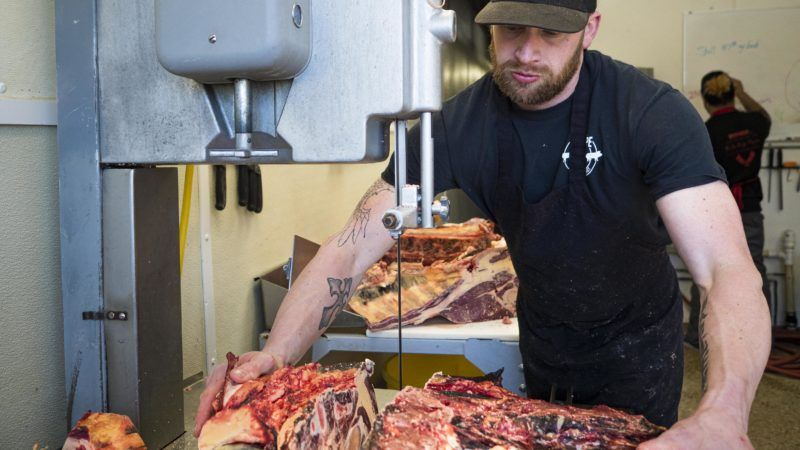What Is Government's Proper Role in Reopening the Food Economy?
When it comes to the food economy, government should remember that workers and consumers call the shots.

Earlier this week, Pres. Trump issued an executive order mandating that America's meat processors remain open for business.
The order directs U.S. Department of Agriculture (USDA) Secretary Sonny Purdue to "take all appropriate action… to ensure that meat and poultry processors continue operations[.]" It comes as a growing number of meat processors—plants where the vast majority of the nation's livestock animals are killed, cut up, and/or processed to be sold by grocers, restaurants, and others—have been forced to close temporarily or reduce output because a growing number of employees and USDA inspectors who work in the plants have been sickened or died from COVID-19. Consequently, the nation's meat supply is at risk, which is what spurred the president's order.
Yet the order doesn't appear to be terribly well thought out. The president may be able (under a 1950 law) to order plants to stay open. But he can't order their workers to work.
"One logical outcome of the order is that plants will close due to strikes by union plant workers and/or [USDA] inspectors," I tweeted as Trump announced the order. "Gov[ernmen]t may force a plant to stay open, but it can't (nor should it) force scared/sick/dying people to risk their lives for hot dogs."
As I predicted, a union representing plant workers blasted the order and meat plant workers in two states went on strike. "We only wish that this administration cared as much about the lives of working people as it does about meat, pork, and poultry products," says union president Stuart Applebaum.
Forcing plants to stay open now could cause other, bigger problems, including "future waves of plant shutdowns far more economically devastating than the cost of getting it right, right now," argues a Bloomberg writer.
The Trump administration's ill-conceived and probably toothless meatpacking order highlights questions about the role government should play in reopening the food economy. Should federal, state, or local governments—or some combination—wield magic wands and tell restaurants, bars, meat processors, grocers, and other food businesses when to open and close, how to properly sanitize their spaces, or instruct these businesses how best to serve customers safely?
Government does these things already, to varying degrees, through a combination of licenses, permits, regulations, and inspections. For example, most food businesses in this country have a maximum occupancy or capacity, established usually by local regulation. Governments that want to mandate social distancing at restaurants might slash that maximum occupancy—say by half or more—at least until the pandemic ends or an effective vaccine has been developed and distributed widely.
But while governments may already have these powers, they don't have a great track record of using them successfully. As I've detailed many times in columns here at Reason and in my book, Biting the Hands that Feed Us, many well-intentioned food regulations don't make a lick of sense—even ones intended to keep eaters healthy and our food safe.
Take the (since-repealed) California law that required foodservice workers to wear disposable gloves while preparing food, something that was intended to boost food safety but which experts pointed out actually made food more likely to be contaminated and less safe for consumers.
Looking for a more current example? Given that the big meat plants are some of the largest food workplaces in the country and are subject to a host of federal regulations—and they've also been among the businesses hardest hit by the pandemic and have been ordered to stay open despite that fact—it's probably unreasonable not to ask whether we can trust the government's approach to combating and overcoming this pandemic.
That's particularly true now, since the food economy in two months probably won't resemble what it did two months ago. A report this week in The Atlantic predicts "restaurants will undergo a transformation unlike anything the industry has experienced since Prohibition." That likely includes government-mandated "social-distancing rules that will limit restaurant capacity in order to discourage large crowds." Grocery buying, which has changed already, could possibly be regulated for the worse, with the largest union of grocery store workers in Western Canada arguing that households should be limited to one store trip per week.
Food businesses don't need more red tape. But like nearly everyone, I'm mostly guessing when it comes to ideas about what will most hurt or help as we reopen the food economy. That's why, as uncomfortable as it sounds, I think we should let restaurants, grocers, and other food businesses experiment with different approaches in order to find the best ones. The virus didn't change the fact that there is no one way to safely operate a restaurant or a grocery store. If regulations mandate one approach to creating COVID-unfriendly food spaces, then we will miss important opportunities to innovate and save lives. Rather than creating burdensome new rules, government—in partnership with scientists, the public health community, civil society, business, and others—should focus on studying, identifying, and communicating best (and worst) practices to businesses and the general public.
Ultimately, though, decisions about whether, when, and how to reopen a business are best left up to individuals and companies. Government has an important role to play, but regular Americans—restaurant owners, bartenders, meat plant workers, waiters, grocery clerks, baristas, and others—are the only ones who can revive the food economy.
